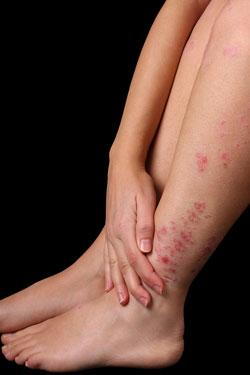Psoriasis can be just as confusing as it is irritating. With countless conditions triggering a flare up, pinpointing the cause is difficult. However, diagnosing and treating psoriasis is easy with help from dermatologists Drs. W. Trent Massengale and Jessica LeBlanc at Atlas Dermatology in Prairieville and Baton Rouge, LA.
What is psoriasis?
Psoriasis is a skin disorder in which the skin cells reproduce as much as 10 times faster than normal. This increase in skin cell turnover produces red, scaly, itchy and irritated patches, or plaques, of skin. The cause of psoriasis varies greatly, and can include emotional stress, infection, certain medications or trauma.
Types of Psoriasis
Symptoms of psoriasis vary depending on the classification of the condition you have. Types of psoriasis include:
- Plaque psoriasis: Plaque psoriasis is the most common form of the skin disorder. It causes plaques of irritated, red and itchy skin. These patches are sometimes covered with scale-like silvery skin which can crack and bleed.
- Pustular psoriasis: Scaly, red and irritated skin appears mostly on the hands and face. This classification also causes small pustules to form.
- Erythrodermic psoriasis: This type of psoriasis can become very severe and should be seen by a doctor immediately. Severe red patches and scales which come off in sheets are characteristic in this classification of the disorder.
- Guttate psoriasis: Guttate psoriasis often begins in early childhood with red spots on the arms, legs and torso.
- Inverse psoriasis: Inverse psoriasis occurs in folded areas of the skin, such as under breasts, in the armpits or in the groin.
Other general symptoms of psoriasis include pitting and discoloration of the fingernails and toenails and plaques on the scalp.
How is psoriasis treated?
Treating psoriasis depends on the severity of the condition. Special ointments, which include steroids or salicylic acid, treat many cases. Oral tablets also relieve symptoms of psoriasis. Light therapy uses exposure to UV light to this condition. Changes to diet and homeopathic remedies, such as aloe vera or fish oil, may also help relieve symptoms.
Contact your Prairieville and Baton Rouge dermatologists
For more information on psoriasis, please contact Drs. W. Trent Massengale and Jessica LeBlanc at Atlas Dermatology in Prairieville and Baton Rouge, LA. Call (225) 313-4560 to schedule your appointment today!
